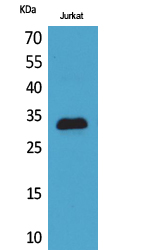p57 Polyclonal Antibody
- Catalog No.:YT5342
- Applications:WB;IF;ELISA
- Reactivity:Human;Mouse;Rat
- Target:
- p57
- Fields:
- >>Cell cycle
- Gene Name:
- CDKN1C
- Protein Name:
- Cyclin-dependent kinase inhibitor 1C
- Human Gene Id:
- 1028
- Human Swiss Prot No:
- P49918
- Mouse Gene Id:
- 12577
- Mouse Swiss Prot No:
- P49919
- Immunogen:
- The antiserum was produced against synthesized peptide derived from human p57Kip2 around the non-acetylation site of Lys278. AA range:241-290
- Specificity:
- p57 Polyclonal Antibody detects endogenous levels of p57 protein.
- Formulation:
- Liquid in PBS containing 50% glycerol, 0.5% BSA and 0.02% sodium azide.
- Source:
- Polyclonal, Rabbit,IgG
- Dilution:
- WB 1:500 - 1:2000. ELISA: 1:20000.. IF 1:50-200
- Purification:
- The antibody was affinity-purified from rabbit antiserum by affinity-chromatography using epitope-specific immunogen.
- Concentration:
- 1 mg/ml
- Storage Stability:
- -15°C to -25°C/1 year(Do not lower than -25°C)
- Other Name:
- CDKN1C;KIP2;Cyclin-dependent kinase inhibitor 1C;Cyclin-dependent kinase inhibitor p57;p57Kip2
- Observed Band(KD):
- 32kD
- Background:
- This gene is imprinted, with preferential expression of the maternal allele. The encoded protein is a tight-binding, strong inhibitor of several G1 cyclin/Cdk complexes and a negative regulator of cell proliferation. Mutations in this gene are implicated in sporadic cancers and Beckwith-Wiedemann syndorome, suggesting that this gene is a tumor suppressor candidate. Three transcript variants encoding two different isoforms have been found for this gene. [provided by RefSeq, Oct 2010],
- Function:
- disease:Defects in CDKN1C are a cause of Beckwith-Wiedemann syndrome (BWS) [MIM:130650]. BWS is a genetically heterogeneous disorder characterized by anterior abdominal wall defects including exomphalos (omphalocele), pre- and postnatal overgrowth, and macroglossia. Additional less frequent complications include specific developmental defects and a predisposition to embryonal tumors.,disease:Defects in CDKN1C are involved in tumor formation.,function:Potent tight-binding inhibitor of several G1 cyclin/CDK complexes (cyclin E-CDK2, cyclin D2-CDK4, and cyclin A-CDK2) and, to lesser extent, of the mitotic cyclin B-CDC2. Negative regulator of cell proliferation. May play a role in maintenance of the non-proliferative state throughout life.,similarity:Belongs to the CDI family.,tissue specificity:Expressed in the heart, brain, lung, skeletal muscle, kidney, pancreas and testis. High levels ar
- Subcellular Location:
- Nucleus .
- Expression:
- Expressed in the heart, brain, lung, skeletal muscle, kidney, pancreas and testis. Expressed in the eye. High levels are seen in the placenta while low levels are seen in the liver.
- June 19-2018
- WESTERN IMMUNOBLOTTING PROTOCOL
- June 19-2018
- IMMUNOHISTOCHEMISTRY-PARAFFIN PROTOCOL
- June 19-2018
- IMMUNOFLUORESCENCE PROTOCOL
- September 08-2020
- FLOW-CYTOMEYRT-PROTOCOL
- May 20-2022
- Cell-Based ELISA│解您多样本WB检测之困扰
- July 13-2018
- CELL-BASED-ELISA-PROTOCOL-FOR-ACETYL-PROTEIN
- July 13-2018
- CELL-BASED-ELISA-PROTOCOL-FOR-PHOSPHO-PROTEIN
- July 13-2018
- Antibody-FAQs
- Products Images

- Western Blot analysis of Jurkat cells using p57 Polyclonal Antibody. Secondary antibody(catalog#:RS0002) was diluted at 1:20000

- Immunohistochemical analysis of paraffin-embedded human-mammary-cancer, antibody was diluted at 1:100

- Western blot analysis of extracts from Jurkat cells, using p57Kip2 (Ab-278) Antibody.



